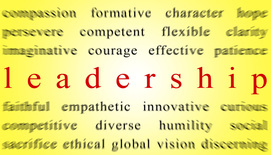
I recently read an article in which a world renowned leadership expert shared his thoughts on how leaders can improve their standing amongst their colleagues. I have also read the opinion that it is better to just go out and find leadership talent than invest in developing your existing talent. I have long been troubled by the notion that leadership skills are less obtainable than hair color. For some reason there is a prevailing notion that leadership is something you’re either born with or not. I disagree. Here are a few simple things that, if applied with practice, can have a lasting impact on the development of our leadership skills. The skills below do not cover everything it takes to be a good leader, but are some of the most important.
1. Have an attitude of “We” not “Me”: Effective leaders foster a team first environment. They realize the whole is greater than the sum of the parts and strive to demonstrate what it means to put the team first. Nothing will ruin your leadership effectiveness in your organization quicker than demonstrating that you care more about your own motives more than the team’s goals and well being. Nothing will build your credibility quicker than proving to your team that you are invested in the team above any personal ambition.
2. Communicate more effectively: Communication is to leadership as water is to a tree. It is essential for lasting growth and life. Most of us know how to communicate, that’s not the issue, but we struggle to apply it day to day. Be sure not to send mix messages in your communication. Be consistent and realize that the majority of communication takes place outside of the words we use. Make sure your words, actions, eye contact, and gestures all send the same message. Changing something as simple as negative body language will greatly increase your leadership effectiveness. By making an effort to be a deliberate and clear communicator you will become more confident as a leader and those in your organization will inevitably be more confident in you.
3. Be authentic: Invest in relationships. Your leadership effectiveness will increase when people begin to see you as approachable and genuine. Take the time to be out and about, championing the ideas and abilities of others while letting them know that you are not only a part of the team but on their team. Lead with your heart. Others need to see that you sincerely care about them, the vision of the organization, the messages you send, and the priorities you set. And above all, make sure that you are the example of authentic integrity in everything you do. Failed integrity will always lead to failed leadership.
Are these principles too complicated for your everyday leader? Absolutely not, they can be applied by any leader at any time! The beauty of the whole thing is that most leaders already know these principles and see their value. They just need to learn to apply them. An increased effort on doing the little things as a leader will ultimately yield extraordinary results. Just the effort itself will be noticed and appreciated. That's right. In many cases, you'll get points just for making an honest effort in these areas. That doesn't mean you should stop there. Constantly developing leadership skills is what the best leaders do. Complacency leads to failure. So even if you think you've got these skills down, it will help you to go over them again.
1. Have an attitude of “We” not “Me”: Effective leaders foster a team first environment. They realize the whole is greater than the sum of the parts and strive to demonstrate what it means to put the team first. Nothing will ruin your leadership effectiveness in your organization quicker than demonstrating that you care more about your own motives more than the team’s goals and well being. Nothing will build your credibility quicker than proving to your team that you are invested in the team above any personal ambition.
2. Communicate more effectively: Communication is to leadership as water is to a tree. It is essential for lasting growth and life. Most of us know how to communicate, that’s not the issue, but we struggle to apply it day to day. Be sure not to send mix messages in your communication. Be consistent and realize that the majority of communication takes place outside of the words we use. Make sure your words, actions, eye contact, and gestures all send the same message. Changing something as simple as negative body language will greatly increase your leadership effectiveness. By making an effort to be a deliberate and clear communicator you will become more confident as a leader and those in your organization will inevitably be more confident in you.
3. Be authentic: Invest in relationships. Your leadership effectiveness will increase when people begin to see you as approachable and genuine. Take the time to be out and about, championing the ideas and abilities of others while letting them know that you are not only a part of the team but on their team. Lead with your heart. Others need to see that you sincerely care about them, the vision of the organization, the messages you send, and the priorities you set. And above all, make sure that you are the example of authentic integrity in everything you do. Failed integrity will always lead to failed leadership.
Are these principles too complicated for your everyday leader? Absolutely not, they can be applied by any leader at any time! The beauty of the whole thing is that most leaders already know these principles and see their value. They just need to learn to apply them. An increased effort on doing the little things as a leader will ultimately yield extraordinary results. Just the effort itself will be noticed and appreciated. That's right. In many cases, you'll get points just for making an honest effort in these areas. That doesn't mean you should stop there. Constantly developing leadership skills is what the best leaders do. Complacency leads to failure. So even if you think you've got these skills down, it will help you to go over them again.
 RSS Feed
RSS Feed